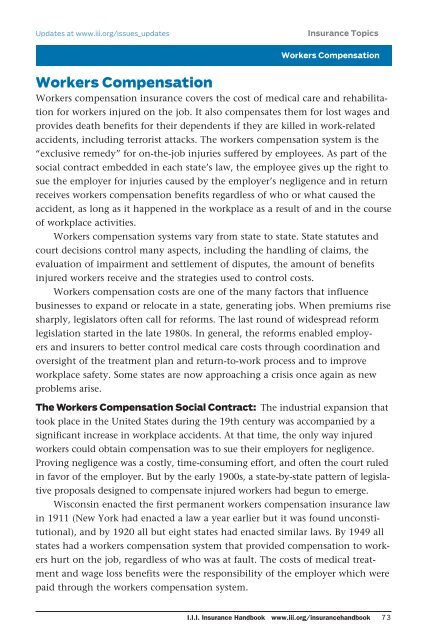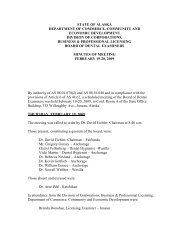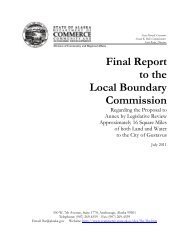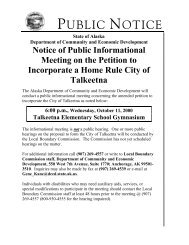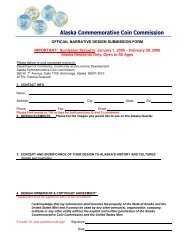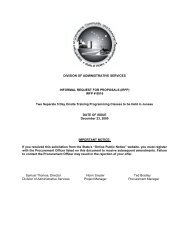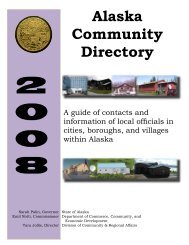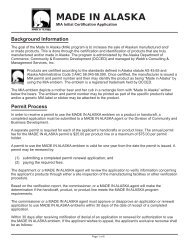Insurance Handbook - Alaska Department of Community and ...
Insurance Handbook - Alaska Department of Community and ...
Insurance Handbook - Alaska Department of Community and ...
You also want an ePaper? Increase the reach of your titles
YUMPU automatically turns print PDFs into web optimized ePapers that Google loves.
Updates at www.iii.org/issues_updates <strong>Insurance</strong> Topics<br />
Workers Auto Compensation<br />
<strong>Insurance</strong><br />
Workers Compensation<br />
Workers compensation insurance covers the cost <strong>of</strong> medical care <strong>and</strong> rehabilita-<br />
tion for workers injured on the job. It also compensates them for lost wages <strong>and</strong><br />
provides death benefits for their dependents if they are killed in work-related<br />
accidents, including terrorist attacks. The workers compensation system is the<br />
“exclusive remedy” for on-the-job injuries suffered by employees. As part <strong>of</strong> the<br />
social contract embedded in each state’s law, the employee gives up the right to<br />
sue the employer for injuries caused by the employer’s negligence <strong>and</strong> in return<br />
receives workers compensation benefits regardless <strong>of</strong> who or what caused the<br />
accident, as long as it happened in the workplace as a result <strong>of</strong> <strong>and</strong> in the course<br />
<strong>of</strong> workplace activities.<br />
Workers compensation systems vary from state to state. State statutes <strong>and</strong><br />
court decisions control many aspects, including the h<strong>and</strong>ling <strong>of</strong> claims, the<br />
evaluation <strong>of</strong> impairment <strong>and</strong> settlement <strong>of</strong> disputes, the amount <strong>of</strong> benefits<br />
injured workers receive <strong>and</strong> the strategies used to control costs.<br />
Workers compensation costs are one <strong>of</strong> the many factors that influence<br />
businesses to exp<strong>and</strong> or relocate in a state, generating jobs. When premiums rise<br />
sharply, legislators <strong>of</strong>ten call for reforms. The last round <strong>of</strong> widespread reform<br />
legislation started in the late 1980s. In general, the reforms enabled employers<br />
<strong>and</strong> insurers to better control medical care costs through coordination <strong>and</strong><br />
oversight <strong>of</strong> the treatment plan <strong>and</strong> return-to-work process <strong>and</strong> to improve<br />
workplace safety. Some states are now approaching a crisis once again as new<br />
problems arise.<br />
The Workers Compensation Social Contract: The industrial expansion that<br />
took place in the United States during the 19th century was accompanied by a<br />
significant increase in workplace accidents. At that time, the only way injured<br />
workers could obtain compensation was to sue their employers for negligence.<br />
Proving negligence was a costly, time-consuming effort, <strong>and</strong> <strong>of</strong>ten the court ruled<br />
in favor <strong>of</strong> the employer. But by the early 1900s, a state-by-state pattern <strong>of</strong> legislative<br />
proposals designed to compensate injured workers had begun to emerge.<br />
Wisconsin enacted the first permanent workers compensation insurance law<br />
in 1911 (New York had enacted a law a year earlier but it was found unconstitutional),<br />
<strong>and</strong> by 1920 all but eight states had enacted similar laws. By 1949 all<br />
states had a workers compensation system that provided compensation to workers<br />
hurt on the job, regardless <strong>of</strong> who was at fault. The costs <strong>of</strong> medical treatment<br />
<strong>and</strong> wage loss benefits were the responsibility <strong>of</strong> the employer which were<br />
paid through the workers compensation system.<br />
I.I.I. <strong>Insurance</strong> <strong>H<strong>and</strong>book</strong> www.iii.org/insuranceh<strong>and</strong>book 73


